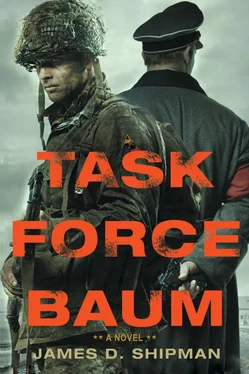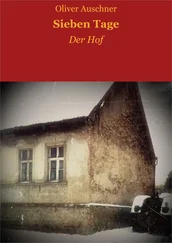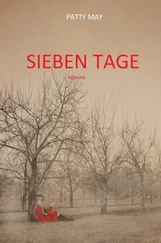Waters nodded. “Fetch me a sheet, and I’ll put together a little group.”
Goode gave the orders, and Waters moved through the officers, asking for volunteers. Everyone raised their hand. Waters selected a couple of men. Goode returned minutes later with a large gray handkerchief. “Best I could do,” he said.
“It will get the job done.”
The door ripped open, and Curtis was surprised to see General von Goeckel there, flanked by a couple of guards. He strolled into the building and approached Goode, saluting crisply to the POW commander.
The men were silent, not sure what was happening. Goode saluted cautiously in return. “What can we do for you, General?”
“The situation outside is hopeless,” the German said. “I am surrendering the command to you, and I will take no further responsibility for casualties. You need to get ahold of your friends and call a cease-fire.”
“We were just thinking the same thing, General. Only problem is your men won’t be too keen on us waltzing out of this building.”
“You can take Zimmerman here with you,” he said, pointing to a sergeant. “He’s a translator, and he’ll give the orders to my men.”
Goode nodded. “Much obliged, sir.” He turned to Waters. “Get hustling out there, John. Let’s shut this thing down before anyone else gets killed.”
Waters nodded, taking the handkerchief and motioning for his men and the translator to follow.
“Be careful out there,” said Goode, and he saluted.
Waters returned the gesture and opened the door, taking in the scene around him for a few moments before he stepped out into the maelstrom. Men huddled at the door, watching the lieutenant colonel and his small party heading out toward the fence to try to shut down the battle.
Curtis wanted to see. He lifted himself from the chair, gritting through the pain, and hobbled over toward the door. He reached the group of men clustered at the threshold and placed his hands on the shoulders of one of them, holding on so he could keep his position. His view was partially blocked, but he could see Waters marching toward the fence line.
On the horizon, he saw burning tanks. Tracers zipped past, walking along the edge of another barracks. Guards, gray ghosts outlined against the fields beyond, ran this way and that, pausing for a moment to fire before moving again.
Curtis felt the old panic. He flashed back to the snow, the panzers, death raining from above. His breathing came in rattled gasps, and he fell against the threshold, laboring to maintain his balance. The fighting was all around him again. Last time, he’d lost Hanson—along with his entire company. What might he lose now?
He looked up in terror, realizing with wretched pain who was in danger now. He screamed for Waters, trying desperately to call him back. But it was too late. With the battle raging around them, there was no way the colonel could hear his words.
As Curtis watched, Waters’s little group approached a German guard. The man whipped his rifle around and pointed it at the colonel. Curtis could see the translator talking, arms waving, frantically pointing back at the barracks and then at the attacking Americans. The guard shook his head, raising the rifle again.
Curtis stepped forward, calling, trying to attract their attention. The sky spun, and he tumbled to the porch. Desperately he tried to crawl, his arm extended, trying to stop what was unfolding in front of him. There was nothing he could do. The rifle belched flame. Curtis heard the retort a fraction of a second later, one shot among thousands. Waters flew backward, hitting the ground hard a few yards away. Curtis shouted and screamed. He buried his head in his left forearm, his right hand clutched in a fist, beating the wooden porch. Not again. He’d failed again. The tears fled down his cheeks. He lay there as bullets and shells crashed in among them, helpless and impotent—as ever.
Oflag XIII
March 27, 1945, 1300 hours
Hall and Stiller pressed hard against the back of the light tank. Bullets ricocheted off the armored skin, and explosions rocked the force. Where was the damned artillery coming from? They were losing tanks, and if they didn’t stop the Germans soon, they wouldn’t have a force to bring the men back out.
Then miraculously, the shelling stopped. It took long moments for Hall to realize it, but while the small-arms fire continued, the artillery had ceased. The tanks must have located the enemy and wiped them out. They were able to advance again now, the Shermans rumbling forward and spewing their cannon fire into the camp. A tower was hit as Hall watched, exploding in fire from a round. Bodies tore through the air, arms and legs separated to land in gray lumps in the prison yard beyond. The firing was hot. A GI near Hall was hit, then another. He didn’t bother to look at them and concentrated on remaining near the center of the tank, pressed close, out of the line of fire as much as possible.
As they pressed into the camp, Hall looked down the fence line. A half-dozen Germans were kneeling in a line, firing their rifles at the tanks and infantry beyond. He whipped his Thompson over and took aim, then depressed the trigger, firing a volley. His bullets hit the mark, felling two of the guards. The others turned to face this new threat, raising their rifles, but were driven off by thirty-caliber machine-gun fire by the tanks pressing in front of them. To his left, a group of POWs were pulling a wounded man back toward what looked like a barracks. Behind them, several Germans raised their hands in the air. Even as Hall absorbed this information, the firing slackened. Within a few minutes, it was over. The Oflag was theirs.
Baum bounded up, surrounded by a press of men. He was smiling a tight-lipped grin, surveying the conquered POW camp. Germans were approaching, arms raised, and the infantry were already taking the enemy into custody.
“Great job, Baum,” said Stiller, walking up to shake the captain’s hand. “You got us here.” He motioned for the captain to step aside, and they huddled together. Hall was the only other person in earshot.
Baum nodded. “Now I have to get us back. You came here for a reason, Stiller. How much time will you need to find Patton’s son-in-law?”
“Shouldn’t take long. There’s what? Two or three hundred POWs? I’d say five minutes tops.”
“Okay, that’s fine. We’ve got to hump out of here as quickly as possible. I don’t know where that artillery came from, but there could be more out there, not to mention any other reinforcements closing in on us. I’ll get the rest of the POWs loaded up while you find your target. What’s his name? I can spread the word.”
“I’d rather we didn’t do that, sir. I’m not sure Patton wants his intentions for this raid known. If we tell everyone why we’re here, there’s no way it stays a secret.”
Baum grunted. “I guess I can see why. The whole thing stinks like dead fish to me. We’ve lost a batch of men already to rescue some POWs that would be free in a month. All for one man.”
“Orders are orders. I don’t second-guess the chief. You’ll do well to do the same. I’ll get going.” He turned to the lieutenant. “Let’s move, Hall. Keep that Thompson handy just in case. The krauts are surrendering, but I don’t want to run into any heroes.”
Even as they moved past the Shermans, they saw the prisoners. Scores of men emerged from a dozen buildings nearby. Almost an endless stream. They stepped out tentatively at first, but soon they were rushing forward, arms in the air, laughing and shouting. The first of them reached some of the infantry and threw their arms around them, kissing their cheeks, tears running down their faces.
Читать дальше












